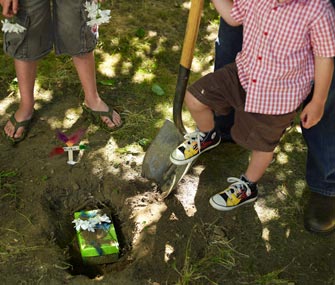How This Vet Talks to Kids About Pet Death
Published on August 08, 2012

A couple of weeks ago, I went on an odd house call in which I was quietly led through a side yard gate to a small, well-appointed pool house.
The purpose of my visit, as with so many of my house calls, was at-home euthanasia.
The point of all the surreptitiousness, however, was more to do with ensuring that the kids — a 4-year-old and an 8-year-old who were busy watching TV in the main house — weren’t exposed in any way to the death happening across the pool from them.
This struck me as rather strange. After all, death is a part of life, one that we all have to face at some point. And, frankly, it seemed odd that people who are enlightened enough to want their pet euthanized at home would hold out on their kids when it came to something so, well, life-altering.
For many days afterward, I kept kicking it around in my head: How were the kids informed — if at all — of how their pet died?
If they had remained oblivious, it seemed to me as if they’d been cheated somehow.
Of course, that's not to say that I’m challenging anyone’s parenting skills. As the single mom of a teenager, I’m sensitive to the intrusion of others’ best intentions.
Nonetheless, I do hold strong opinions on the subject of pet death and the underage set — and my clients will occasionally ask me to reveal them. Here’s what I tell owners:
Don't Keep Kids in the Dark
Just as I believe that every owner deserves to know the entire truth of a pet’s condition — no exceptions — every child has the right to know if their pet has died or has been euthanized.
Why some parents wait is a mystery to me. The fact that a vacation is coming up or a violin concert is looming aren't good excuses.
Case in point: I’ll never quite get past the fact that my mother waited until my final exams were over during my first semester at college before telling me that my childhood Lab had died. I totally get why she did it, but I don’t believe that it was the right approach.
Do Be Age-Appropriate
Although the words you use will doubtless vary with age, any child old enough to have a relationship with a pet is old enough to be informed that a pet has passed.
Don't Hold Back Too Much
Give it to them straight. Kids can end up feeling betrayed if they’re left out of the loop — and feelings of betrayal don’t help children to cope and heal.
This doesn’t mean that you have to describe how you found your pet dying under a tree in the yard, but you do have to provide some context — the level of detail will inevitably vary based on your child’s age.
Keeping them informed throughout a pet’s illness also prepares them, so imparting details in real time is equally beneficial.
Do Give Thought to What You'll Say
This is a big sticking point for a lot of people: How do you properly deliver the news that death is near or a pet has passed?
What’s actually spoken depends on the child’s personality, the closeness of the kid-pet relationship, and the child’s age. But as long as you use age-appropriate language, I believe the fundamentals are the same:
Speak plainly, using as few euphemisms as possible. And definitely use the “D” word.
Take the time to discuss your personal beliefs about death.
Share your feelings. However, if possible, it’s always best to save the serious breakdown until after a child's feelings have been squared away.
Be willing to accept aloofness as a sign of a common coping mechanism. Asking for a new pet immediately is another frequent request, so don't take it too hard if this comes up.
Do Allow Them to Be Present
Whether or not kids should be present when a pet is euthanized seems especially fraught for many parents. Indeed, it’s rare for me to see a kid of any age at a euthanasia visit.
Yet I personally think that there’s something off about this.
If it’s within your own personal values and practices to remain present, then I believe it’s also fitting for your children to attend, obviously dependent on personality-specific issues and age-appropriate concerns. In my opinion, however, most kids over the age of reason are good candidates.
I know it sounds harsh, but pets really are practice in a way. After all, the death of a pet is surely a softer blow than the death of a close relative. And I personally believe that when kids learn to ponder death through pet experiences, it tends to make them stronger individuals who process death better when they’re tested later in life.
Do Consider Opportunities for Closure
Hold a service, say a prayer, plant a tree . . . it all works.
Offering a concrete reminder is also a good idea: Cremains, clay pawprints and professional-quality portraits are great, but even something as simple as a lock of fur will do. Kids often need these more than we think that they do.
Don't Forget
It might be hard to do immediately, but recalling past pets is a profitable family pastime. Tell a funny story over dinner, encouraging kids to do the same. And repeat this routine regularly.
We would all do well to remember that kids are just like the rest of us. And what any of us needs when it comes to dealing with pet death is honesty, mutual respect, and an opportunity to process and grieve in a safe and supportive environment.
Check out more opinion pieces on Vetstreet.





